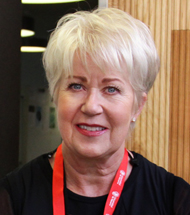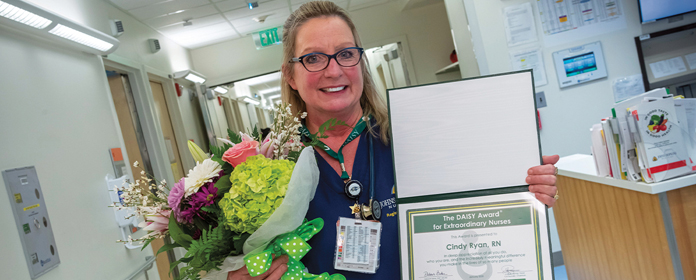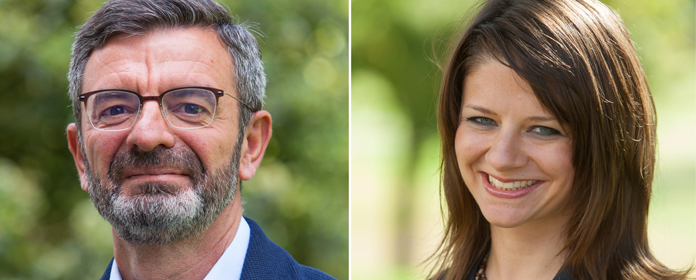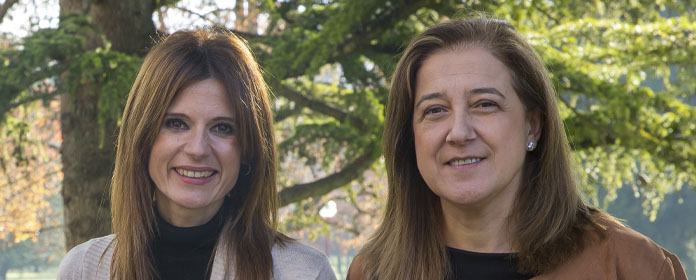“Los cuidados paliativos no tratan sobre la muerte, sino de vivir bien con una enfermedad avanzada”
Carole Robinson, investigadora visitante del Programa ATLANTES del ICS, ha ofrecido un curso para profesionales sanitarios sobre conversaciones significativas al final de la vida

FOTO: Natalia Rouzaut
Hablar sobre los últimos momentos de la vida ante una enfermedad avanzada puede resultar complicado para el paciente, para su familia y también para los profesionales de la salud. Sin embargo, conversar con el enfermo sobre lo que es importante para él puede resultar crucial en este trance. “Los cuidados paliativos no tratan sobre la muerte, sino de vivir bien con una enfermedad avanzada”, recuerda Carole Robinson, profesora emérita de Enfermería en la Universidad de British Columbia (Canadá) e investigadora visitante del Programa ATLANTES del Instituto Cultura y Sociedad (ICS) de la Universidad de Navarra.
La experta ha visitado la Universidad de Navarra para ofrecer el taller ‘Serious Illness Conversation’ (‘Tenemos que hablar’), que organiza el Programa ATLANTES. La iniciativa surgió como un programa desarrollado conjuntamente por el Brigham and Women’s Hospital y el Harvard T.H. Chan School of Public Health de EE. UU. En concreto, ofrece un marco para ayudar a los profesionales de la salud a tener conversaciones significativas con un paciente con enfermedad avanzada.
En el taller se enseña el momento en el que empezar la conversación, los pasos que dar a lo largo del tiempo e, incluso, las palabras exactas que utilizar en cada momento ya que se ha perfilado cuáles resultan aceptables para pacientes y familiares.
“Si conversamos con el paciente sobre qué es relevante para él, podremos saber qué valora, lo que guiará la práctica clínica y podremos ofrecer el mejor cuidado acorde con esa persona”, asegura Robinson. Por ejemplo, si una persona, ante la perspectiva de la muerte, quiere pasar tiempo de calidad con su familia, se podrá intentar ofrecer un cuidado a domicilio y no ingresarle en una Unidad de Cuidados Intensivos.
“En estas conversaciones se exploran aspectos clave sobre cómo quieren vivir su vida, los cuidados tratan sobre tener calidad de vida con una enfermedad”, destaca. Según la investigadora, estas conversaciones permiten mejorar la comunicación general, la toma de decisiones médicas, ayudan a la familia en el duelo –ya que han comprobado que “el final de la vida ha tenido un significado” – e, incluso, se ha demostrado que reducen la ansiedad y la depresión del paciente.
Miedo a hablarLa experta canadiense lamenta que actualmente estas conversaciones no sean frecuentes en gran parte de los casos. Esto se debe a varios factores: el miedo de los profesionales a aumentar el sufrimiento del paciente, a quitar esperanzas, consideran no tener suficiente tiempo o no se sienten con la preparación suficiente.
Robinson desmiente alguno de estos mitos: cita investigaciones que han demostrado que estas conversaciones se pueden compaginar con otras tareas dentro del horario laboral y que ayudan a los profesionales a estar más satisfechos con su trabajo, con sus capacidades y en su relación con el paciente. “Conoces al paciente como persona y eso te da la seguridad de que el cuidado que ofreces se alinea con ese ser humano”, explica.
Pero los profesionales no son los únicos con miedo a conversar. También los enfermos son reticentes a hablar sobre la proximidad de la muerte con sus seres queridos, apunta. Así, dice que no suelen compartir la experiencia de la enfermedad para no hacerles sufrir o no ser una carga. Esto desaparece al hablar con un sanitario: “Un estudio que ha demostrado que las personas que han recibido pronto cuidados paliativos con este tipo de conversaciones han vivido más tiempo que aquellos que no han tenido estos cuidados”.
Robinson asegura que “la investigación es necesaria para convencer de que nuestra experiencia es coherente con los cuidados paliativos y de que es una intervención positiva”. En ese sentido, puntualiza que todos los pasos y todos los resultados de las ‘Serious Illness Conversation’ están respaldados por investigaciones científicas.
Admite que ha habido un gran progreso en la compresión de la experiencia de tener una enfermedad avanzada y cómo ayudar a las personas enfermas. Sin embargo, considera que todavía se necesitan esfuerzos para llevar la teoría a la práctica. “Existe una teoría sobre cómo vivir bien cuando estás muriendo –asegura–. Debemos empezar a explorar, desarrollar e investigar las intervenciones que permitan vivir bien con una enfermedad avanzada”.





